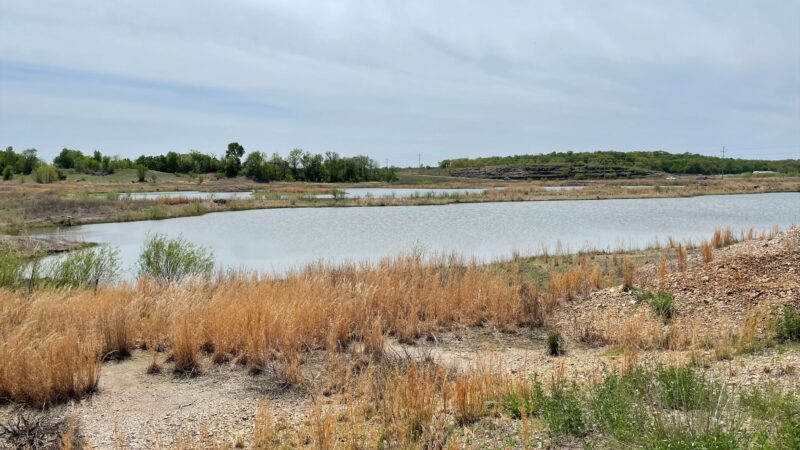Through their research, three Missouri State University students are trying to better understand soil and plants, and their connection to the environment.
Ophelia Pettington, Daphne Miles and Anna Faust can expand their research work thanks to funding from the Webster Groves Nature Study Society.
The organization offers annual scholarships to students in wildlife-related fields.
The Bo Koster Grant for Nature Study is an annual award given to support the research or fieldwork of graduate or undergraduate students in the natural sciences in Missouri and Illinois.
The Menke Scholarship for Wildlife Habitat is an annual award to improve wildlife habitat in Missouri. This is done by planting, protecting, managing, publicizing and demonstrating specific habitat improvements for flora and fauna in Missouri.
The trio conduct research in the Wetlands and Biology Education Research (WeBER) lab at MSU. Dr. La Toya Kissoon-Charles, assistant professor of biology, serves as the students’ research advisor. She teaches courses in aquatic botany, limnology, ecotoxicology and other general biology courses.
“These field opportunities allow students to apply classroom knowledge,” Kissoon-Charles said. “They experience the scientific process firsthand and develop crucial skills for both public and scientific audiences.”
Pettington
Pettington is a graduate student studying microbiology. From St. Louis, she moved to Springfield in 2014 and obtained her bachelor’s degree in biology from MSU in 2019.
Upon graduation, she worked as a microbiologist before coming back to MSU for graduate studies. She plans to pursue a career in bioremediation.
Pettington received the Bo Koster award worth $2,000 to support her fieldwork.
Her research focuses on studying soil microbiomes in mining-contaminated areas. It aims to identify bacteria that may aid in metal tolerance in plants.
By studying the microbial communities present in the soil around plant roots, she seeks to determine if certain bacteria play a role in decreasing the effects of metal contamination on plant growth.
This summer, she plans to collect soil samples from contaminated sites. This involves carefully digging up plant roots to analyze the attached soil.
Using DNA extraction and sequencing, she will analyze the bacteria in the samples.
Additionally, she intends to compare samples from remediated areas with those from untreated sites. This will help her to assess changes in microbial diversity and abundance.
“Receiving this scholarship means more than just financial support,” Pettington said. “It signifies the opportunity to pursue my passion for research and make a meaningful contribution to environmental science.”
Miles
Miles is a biology graduate student from Warrensburg, Missouri. She obtained her undergraduate degree from MSU in 2023, studying environmental biology and evolution.
Upon graduating, she plans to pursue a career with either the Missouri Department of Conservation or the U.S. Fish and Wildlife Service. She also desires to join the Peace Corps or work abroad.
She received the Menke Scholarship worth $2,000 to support her research on native plants and their response to changing conditions.
Her work focuses on Williams Pond, a spring-fed pond located near Diamond, Missouri. The pond experienced a significant disturbance when its man-made dam broke in 2020. This led to a drastic reduction in water depth and ecological changes.
Miles monitors and assesses the impact of this disturbance, specifically on a non-native invasive plant species called Potamogeton crispus. This invasive aquatic plant can impede water flow, reduce oxygen levels and hinder recreational activities.
“Williams Pond is not an isolated ecosystem,” Miles explains. “It connects with other water bodies and raises concerns about the potential spread of invasive species downstream.”
Miles has been surveying the area monthly since May 2023.
Each time, she takes a boat out into the water and samples 12 plots of the pond. She evaluates various parameters using an aqua scope, including plant coverage percentage, water depth and water quality indicators, such as temperature, conductivity, dissolved oxygen and turbidity.
After surveying, she takes her samples and data back to the lab to assess changes over time. The invasive species currently covers almost 100% of the pond’s floor.
“Receiving recognition and funding for my passions is like winning the lottery,” Miles said. “I hope to serve as a role model for aspiring female scientists.”
Faust
Faust is a junior at MSU studying wildlife and fisheries biology with a minor in chemistry.
Originally from Appleton, Wisconsin, she has spent most of her life in Springfield. After graduating, she will pursue a PhD. She plans to work in herpetology (the study of amphibians and reptiles), specifically working with frogs.
Faust received the Bo Koster award worth $1,000 to study Azolla, a water fern species that was unusually present in Lake Springfield.
“Finding Azolla in the area is unique because they’re typically not found in this part of Missouri,” Faust said. “They’re more common farther east or west of Missouri.”
If the number of Azolla continues to rise in Lake Springfield, it may cause disturbances in the ecosystem. The plant grows quickly and could cover the surface area of the water, blocking out most of the sunlight from entering the lake. This in turn can harm the ecosystem’s native plants and other aquatic life.
Faust plans to conduct seasonal research to capture variations in Azolla growth and water chemistry over time.
By comparing areas with Azolla to control sites upstream, she hopes to discover the species’ impact on water chemistry and ecosystem health. This approach allows her to analyze both the immediate effects and long-term implications of Azolla in the ecosystem.
“It means a lot that my research was seen as valuable enough to receive funding,” Faust said. “I’m thankful to Dr. Kissoon-Charles for the guidance she has given me in becoming a researcher.”

